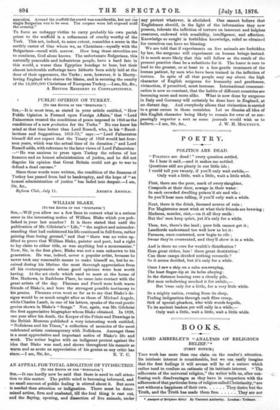WILLIAM BLAKE.
[TO THB EDITOR OF THE "SPECTATOR."] SI11,—Will you allow me a few lines to correct what is a serious error in the interesting notice of William Blake which you pub- lished in your last number? It is there stated that until the publication of Mr. Gilchrist's " Life," " the neglect and misunder- standing that had embittered his life continued in full force, rather gaining than losing ground," and that "there was no voice up- lifted to prove that William Blake, painter and poet, had a right to lay claim to either title, or was anything but a monomaniac." Now, Sir, in the first place, Blake was not'a man unknown to his generation. He was, indeed, never a popular artist, because he never took any reasonable means to make himself so, but he re- ceived during his lifetime the most thorough appreciation from all his contemporaries whose good opinions were best worth having. At the art circle which used to meet at the house of Mrs. Mathews, in Rathbone Place, he came into contact with the great artists of the day. Flaxman and Fuseli were both warm friends of Blake's, and bore the strongest possible testimony to his genius. Flaxman even went so far as to say that Blake's de- signs would be as much sought after as those of Michael Angelo, while Charles Lamb, in one of his letters, speaks of the real poetic genius shown in Blake's " Songs." Nor, again, was Mr. Gilchrist the first appreciative biographer whom Blake obtained. In 1828, one year after his death, the Keeper of the Prints and Drawings in the British Museum published a very interesting work entitled, " Nollekens and his Times," a collection of memoirs of the most celebrated artists contemporary with Nollekens. Amongst these is a most appreciative and important notice of Blake's life and work. The writer begins with an indignant protest against the idea that Blake was mad, and shows throughout his memoir as warm and as acute an appreciation of his genius as any critic has






























 Previous page
Previous page